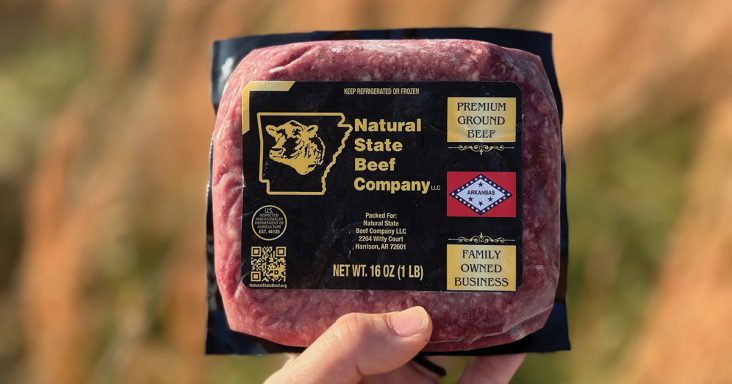The Supply Side: Natural State Beef seeks to place Arkansas beef in more stores
by November 11, 2024 2:17 pm 1,001 views

Harrison-based Natural State Beef is the brainchild of Mike Fountain who said in 2020 when he could not find ground beef at the grocery store amid the COVID-19 pandemic, he began to think about the need for local beef supplies in his home state.
“It was very frustrating to see the local cattle supply backing up because commercial slaughter plants and feed lots were barely running because of worker shortages,” said the third-generation farmer and rancher.
Fountain said he has been in the cattle business his entire life, but when he was young his grandad also raised hogs. He said after feeding the pigs, he would sell them for profit. But over the years, family hog farms have died off, except for a few commercial farms for large companies. He said the Arkansas dairy industry also dried up, and he just could not sit back and watch the cow-calf industry also fold because of the lack of commercial markets.
He began to procure local cows from Arkansas livestock auctions and have them slaughtered and butchered into hamburger meat for retail and wholesale markets. Fountain said he works to use Arkansas cows which he buys at auction barns from Harrison, Morrilton, Ratcliff/County Line and even as far west as Springdale. Fountain and two buyers help him scout out the best cows and pay top dollar to Arkansas families. Fountain said he is often bidding against large packers like Cargill or Tyson Foods.
“We don’t fool with bulls. We buy pasture-raised momma cows and then haul them to one of the local processors we use,” Fountain said.
Local packing houses inspected by the U.S. Department of Agriculture (USDA) are also harder to find. Natural State Beef primarily uses Cyprus Valley slaughterhouse at Pottsville and did use Farm to Fork in Pleasant Plains, but it closed earlier this year. Fountain said he’s used other smaller facilities when they can handle the entire load, given it’s so expensive to haul cattle to multiple slaughterhouses. Natural State Beef uses USDA-inspected plants. Fountain also said he sources the boxes and labels from Arkansas-based companies.
Natural State Beef uses a just-in-time inventory model, so it does not have to store frozen hamburger meat in expensive cold-storage warehouses. Each week, Fountain and his buyers go to auction barns and procure enough cattle for the orders coming in. Fountain said all the muscle meat and trim from the cow is ground to an 85-15 hamburger product that is sold in 1-, 2- and 5-pound brick packaging. There is no filler or solution added to the meat during processing. It’s sprayed for microbials following USDA protocol. The ground meat will last up to one year in the freezer.
“We think we have a good-tasting hamburger product that’s a premium to commercially ground beef with similar fat content,” Fountain said. “We don’t cut out steaks or roasts, and all of the muscle meat is ground up into hamburger. … We average around 425 pounds of ground beef per cow slaughtered, sometimes more if we find larger cows.”
He estimates the company will sell around 400,000 pounds of hamburger this year. Fountain said he would like to grow the business so more local cow/calf farms have another market for their livestock. Local packing facilities that slaughter, debone and grind the meat also benefit. The beef is now sold in select Harps stores, Ozark Natural Foods in Fayetteville and Nature’s Wonders in Harrison.
Fountain said he continues to look for more retail markets, and he recently met with Walmart during the retail giant’s Open Call held in September. While there was interest from Walmart’s meat buyers, Fountain said they were not able to work out a deal. And he will continue to look for other retail opportunities.
“The folks at Walmart were great to talk to us, and we appreciate the meeting,” Fountain said.
Natural State Beef has had interest from food banks and local school cafeterias. Several schools, including Fayetteville and Van Buren, have purchased the hamburger meat to serve in their lunchrooms. Fountain said food banks can use federal money and grants to buy local meat, and they have done so. Restaurants such as the Mockingbird Kitchen in Fayetteville, the Club House in Conway and the Capital Hotel in Little Rock are customers.
Natural State Beef employs eight people, and it is a family-owned business. Fountain said he also has 1,500 acres for grazing and a cow-calf herd.
“The heart of our mission is to provide another market for local cattle. We feel like cattle raised on Arkansas family farms and then ground into a hamburger product will help to keep some of the food supply closer to home. It tastes good and helps support local farms and packing facilities at the same time,” he said.
Editor’s note: The Supply Side section of Talk Business & Politics focuses on the companies, organizations, issues and individuals engaged in providing products and services to retailers. The Supply Side is managed by Talk Business & Politics.
